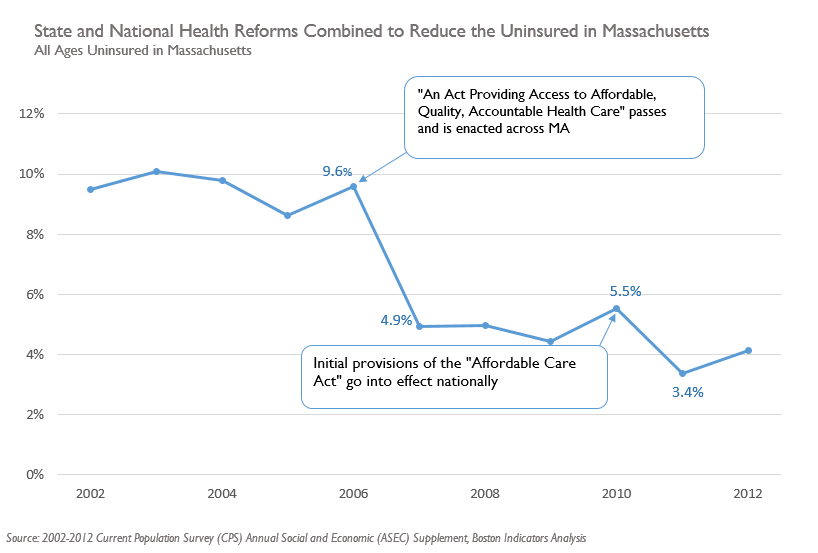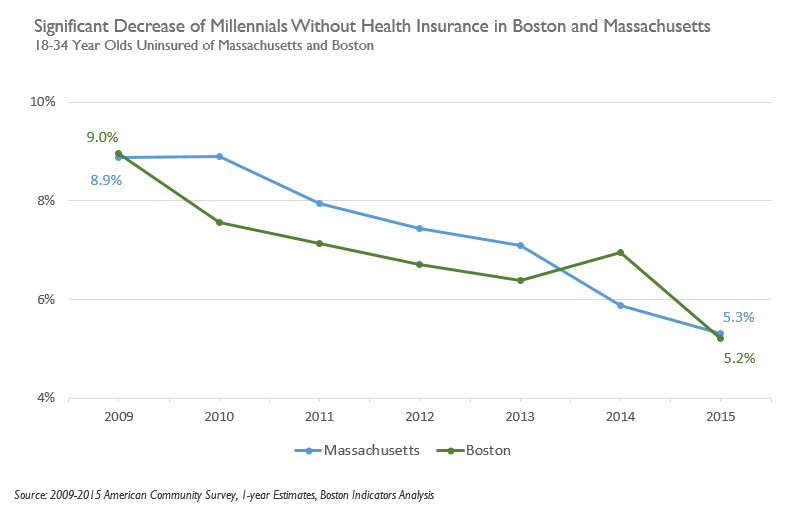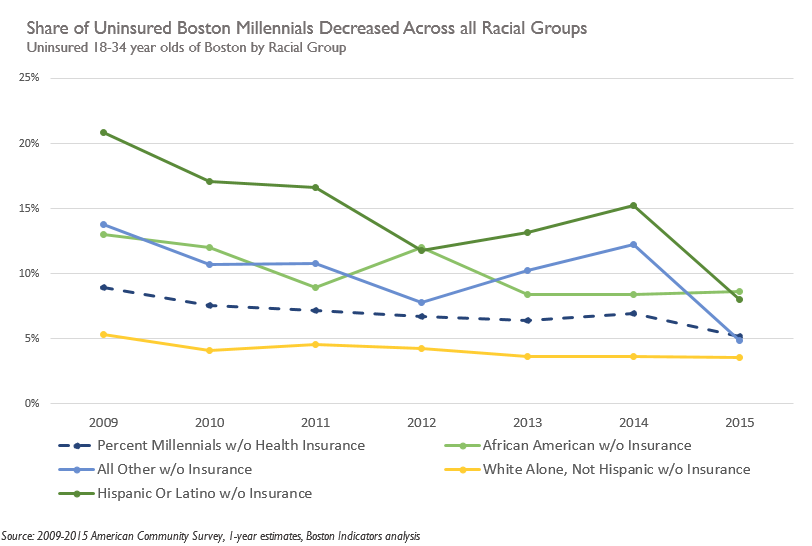The ACA and Millennials: How Health Care has Benefited Boston's Young Adults
By Peter Ciurczak
May 31, 2017
Since the Affordable Care Act (ACA) became law in 2010, the number of Americans without health insurance has declined significantly. One of the largest decreases was among millennials—those currently between the ages of 18 and 34. Across the United States, the uninsured rate for millennials fell 12 percentage points from 2009 to 2015. Even with the ACA however, millennials remain the least likely cohort to have health insurance coverage – with an uninsured rate of 16.4 percent as of 2015.
The initial impact of the ACA on the uninsured rate for millennials can be seen in 2011, as young adults up to the age of 26 gained access to their parent’s private insurance policies. Before the passage of the ACA, access to this feature was limited to full-time college students. This reform vastly expanded coverage amongst millennials nationwide, particularly those between the ages of 19 and 25. In 2013 the drop in uninsured becomes more pronounced, as the health exchanges in many states went live or were expanded (as in Massachusetts’ case), and coverage options increased for millennials not covered by their parents.
Massachusetts
Prior to the Affordable Care Act passing at the national level in 2010, Massachusetts passed and implemented our own health reform law beginning back in 2006—the “Act Providing Access to Affordable, Quality, Accountable Health Care.” In fact, the ACA was modeled in large part off of what we had done in Massachusetts, with both laws having the goal of reducing the number of people without health care. State health reform in 2006 led Massachusetts to have the lowest rate of uninsured in the country. As initial provisions of the ACA went into effect, those too led to a decrease in the uninsured - though a less dramatic drop than from the 2006 health reforms, which picked up many of those that were easier to cover. With both of these programs in place, Massachusetts, at 4.1 percent uninsured in 2012, has become the state with lowest share of people without health insurance in the nation.
Using more granular data found in the US Census Bureau’s American Community Survey, we can see the impact of health care reform directly on the millennial populations of Massachusetts and Boston. The Affordable Care Act led to a decrease in uninsured millennials that closely mirrors the national decrease – uninsured millennials in Massachusetts decreased by roughly 40 percent from 2009 to 2015, while decreasing nationally by around 41 percent.
Despite the 2014 uptick, Boston’s trend is almost identical to that of Massachusetts. Boston’s millennials, starting at an uninsured rate of 9.0 percent in 2009, decreased to 5.2 percent over six years, a hair below the overall Massachusetts’ millennial decrease. And breaking this data down by race, we see that each major racial subgroup experienced a decrease in the share of millennials without health insurance.
Aside from a brief uptick in uninsured in 2013 and 2014 amongst minority groups, overall the ACA drove down the millennial uninsured rate among Hispanics by nearly 62 percent (12.85 percentage points), while the proportion of uninsured African American millennials dropped 33.9 percent (4.41 percentage points) between 2009 and 2015. Amongst white millennials alone – the uninsured rate still dropped 33.4 percent (1.77 percentage points) - though gains here were less dramatic in part due to the fact that white millennials started from a lower level. The final drop in uninsured is reserved for All Other Races (Asian, Some Other Race and Two or More Races), which falls from 13.8 percent uninsured in 2009 to 4.9 percent – a drop of nearly 65 percent (8.9 percentage points).



